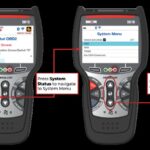OBD2 scanners empower car owners to diagnose and sometimes even fix car problems themselves, potentially saving trips to the dealership. This begs the question: Do Dealers Hate Obd2? While “hate” might be a strong word, it’s understandable why dealerships might not be thrilled with the widespread adoption of OBD2 technology and user-friendly diagnostic software. Let’s explore the relationship between dealerships and OBD2.
Decoding the Dealer-OBD2 Dynamic
Dealerships traditionally rely on diagnostic services as a significant revenue stream. When a car malfunctions, owners often take it to the dealer for diagnosis and repair. This process usually involves using professional-grade OBD2 scanners to pinpoint the issue. However, with affordable and readily available OBD2 scanners for consumers, car owners can now perform basic diagnostics themselves.
This shift in diagnostic power can lead to a decrease in service appointments for dealerships. While simple fixes, like resetting a check engine light after a minor issue, might be handled at home, more complex problems still require professional expertise. This is where the nuance lies.
Why Dealers Might Not Love Your OBD2 Scanner
- Reduced Service Revenue: Self-diagnosis using OBD2 scanners can lead to fewer paid diagnostic appointments at dealerships. This is especially true for minor issues that don’t require specialized tools or in-depth knowledge.
- Customer Empowerment: OBD2 scanners empower car owners with knowledge about their vehicles, potentially leading to more informed decisions about repairs. This could lead to customers questioning recommended services or seeking less expensive alternatives.
- Competition with Independent Mechanics: Armed with OBD2 data, car owners might opt for independent mechanics who often charge less than dealerships. This increased competition can impact dealer profitability.
Where OBD2 Falls Short & Dealers Excel
It’s crucial to understand that consumer-grade OBD2 scanners and apps have limitations. They primarily focus on reading and clearing diagnostic trouble codes (DTCs). While this is valuable, it doesn’t provide the complete picture. Dealerships, on the other hand, have:
- Advanced Diagnostic Equipment: Dealers use sophisticated scanners with proprietary software that can access more in-depth vehicle data and perform advanced diagnostics beyond reading DTCs.
- Specialized Training and Expertise: Dealer technicians undergo extensive training on specific vehicle makes and models, equipping them with the knowledge to diagnose and repair complex issues.
- Access to Technical Service Bulletins (TSBs): Dealers receive TSBs from manufacturers, providing insights into known issues and recommended repair procedures that might not be readily available to the public.
Finding the Balance: OBD2 and Dealerships
While OBD2 might initially seem like a threat to dealerships, it also presents opportunities. Dealers can leverage this technology to build trust and enhance customer relationships. For instance, offering transparent diagnostic services based on OBD2 data can foster confidence.
Furthermore, complex repairs and specialized services remain within the dealer’s domain. OBD2 empowers car owners to identify potential problems early on, potentially leading to preventative maintenance at the dealership that averts more significant issues down the line.
Conclusion: Coexistence, Not Conflict
The relationship between dealers and OBD2 is more complex than simple animosity. While OBD2 empowers consumers and might impact some aspects of dealership revenue, it doesn’t eliminate the need for professional expertise. Instead, it creates a new dynamic where informed car owners and dealerships can coexist, each playing a crucial role in maintaining and repairing vehicles. OBD2 allows for early detection and minor fixes, while dealerships handle complex repairs, specialized services, and advanced diagnostics that are beyond the scope of consumer-level tools.

